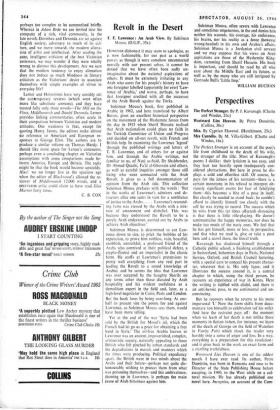Revolt in the Desert
T. E. Lawrence : An Arab View. By Suleiman Mousa. (O.U.P., 35s.)
HOWEVER dishonest it may seem to apologise, as is now fashionable, for our past as a world power, as though it were somehow unconnected morally with our present selves, it cannot be denied that we have often been sadly un- imaginative about the national aspirations of others. It must be extremely irritating to any Arab who cares for his people's history to have one foreigner labelled (apparently for ever) 'Law- rence of Arabia,' and worse, perhaps, to have that foreigner credited with all the successes of the Arab Revolt against the Turks.
Suleiman Mousa's book, first published in Arabic in 1962, and here translated by Albert
Butros, gives an excellent historical perspective on the movement of the Hashemite forces from the day in 1915 when Sherif Hussein realised that Arab nationalism could place no faith in the Turkish Committee of Union and Progress and decided on all-out revolt, with French and British help. In examining the Lawrence 'legend' through the published writings and letters of T. E. Lawrence, and of others for or against him, and through the Arabic writings, not familiar to us, of Nuri as-Said, Dr Shahbender, Dr Ahmed Quadri, Fa'iz al-Ghussein and others, as well as careful inquiries amongst those still living who were connected with the Arab Revolt, it gives us a full documentation of opinion from the Arab side. This collection Suleiman Mousa prefaces with the words: 'But in the works of Lawrence's admirers and de- tractors alike one seeks in vain for a semblance of justice to the Arabs. . . . Lawrence's resound- ing fame was viewed by the Arabs with a mix- ture of amazement and disbelief. This was because they understood the Revolt to be a purely Arab endeavour, carried out by Arabs to achieve Arab objectives.'
Suleiman Mousa is determined to cut Law- rence down to size, to prick the bubbles of his reputation, to prove him ruthless, vain, boastful, snobbish, untruthful, a professed friend of the Arabs who connived at their political defeat, a crypto-Zionist and an imperialist in the classic form. He scoffs at Lawrence's pretensions to pretty well everything from any real part in leading the Revolt to a sound knowledge of Arabic; and he scorns the idea that Lawrence was ever accepted by the haughty Sherifs on any terms other than those dictated by Arab hospitality and his evident usefulness as a demolition expert in the field and, later, as a high-level negotiator in Cairo, Paris and London. But the book loses by being over-long. At one- half its present size the points for and against Lawrence, as Suleiman Mousa sees them, would have been more telling.
Yet at the end of the war 'Syria had been sold by the British for Mosul's oil, which the French had let go as a price for obtaining a free hand in Syria.' The oil-free Arabia known to Lawrence was an ancient, impoverished, complex, aristocratic society, naturally appealing to those British who felt pinched by urban standards and the degradations in morals and manners which the times were producing. Political expediency apart, the British were in two minds about the Arabs and their future—perhaps not quite dis- honourably wishing to protect them from what was poisoning themselves—and this ambivalence, showing up in Lawrence, is perhaps the main cause of Arab bitterness against him.
Suleiman Mousa, often severe with Lawrence and sometimes ungenerous, in the end denies him neither his wounds, his courage, his endurance, his brains, nor his reality as a force (however wrong-headed) in his own and Arabia's affairs. Suleiman Mousa is a Jordanian civil servant and we may suppose that his views on Arab aspirations are those of the Hashemite King- dom, stemming from Sherif Hussein. His book is important, and should be read by all who care about the Middle East and its future, as well as by the many who are still intrigued by Gertrude Bell's 'Little Imp.'
WILLIAM BUCHAN






























 Previous page
Previous page